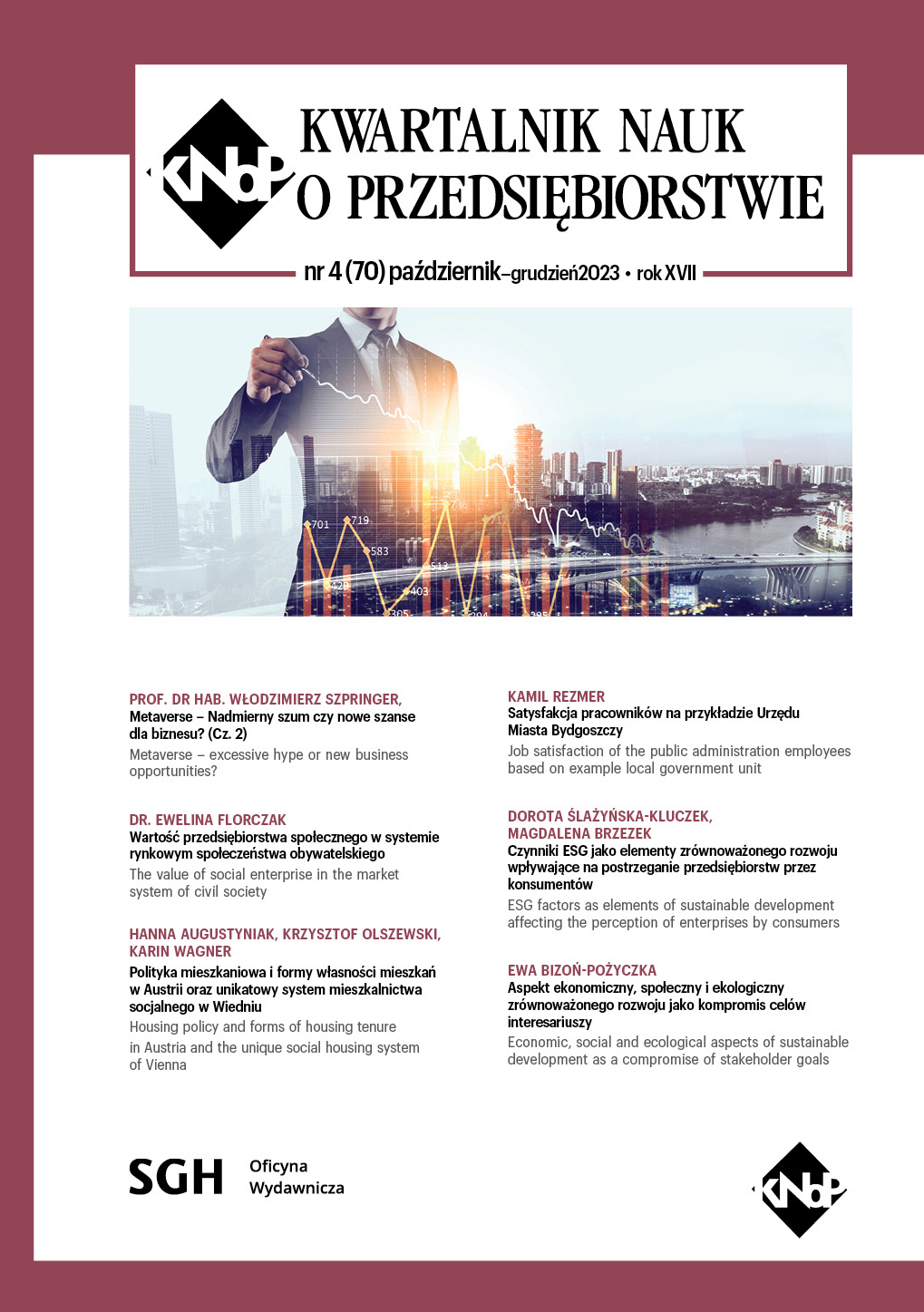Economic, social and ecological aspects of sustainable development as a compromise of stakeholder goals
Main Article Content
Abstract
In the face of ongoing climate change, the level of pro-ecological awareness of society is increasing. Actions to counteract increasing environmental pollution are widely recognized as necessary. The concept of sustainable development has become a permanent part of the dictionary of investors and stakeholders. The decade from 2020 to 2030 is critical in moving the world to a more sustainable one. The aim of the study is to compare selected sustainable development indicators in relation to the global management decision-making process. Achieving sustainable development in all three aspects, i.e. social, economic and environmental, is impossible and requires a compromise consisting in prioritizing one aspect over the others. Economic growth is often chosen over social well-being and ecological concerns. The article identifies sustainable development stakeholders and presents their role in achieving the SDG goals. Then, sustainable development indicators were analyzed in terms of economic, social and environmental aspects in countries with different levels of development. The aim of the study was to verify the statement that the three-pillar model of sustainable development requires compromises and the choice of the priority aspect depends on the level of development of a given country. The study covered 5 underdeveloped countries, 5 developing countries and 5 highly developed countries from around the world. Indicators were compared in 3 aspects and the necessity of compromise in achieving the sustainable development goals was confirmed. The study confirmed that achieving a satisfactory level in all three aspects is possible only in a few highly developed countries. Conclusions and limitations of the study as well as directions for further research are presented.
Downloads
Article Details

This work is licensed under a Creative Commons Attribution 4.0 International License.
The author of the article declares that the submitted article does not infringe the copyrights of third parties. The author agrees to subject the article to the review procedure and to make editorial changes. The author transfers, free of charge, to SGH Publishing House the author's economic rights to the work in the fields of exploitation listed in the Article 50 of the Act of 4 February 1994 on Copyright and Related Rights – provided that the work has been accepted for publication and published.
SGH Publishing House holds economic copyrights to all content of the journal. Placing the text of the article in a repository, on the author's home page or on any other page is allowed as long as it does not involve obtaining economic benefits, and the text will be provided with source information (including the title, year, number and internet address of the journal).
References
Barbier E. B., Burgess J. C. [2017], The Sustainable Development Goals and the Systems Approach to Sustainability, „Economics Discussion Papers”, no. 28, Kiel Institute for the World Economy: Kiel, Germany, http://www.economics-ejournal.org/economics/discussionpapers/2017-28/ (data dostępu: 5.07.2023).
Gupta J., Vegelin C. [2016], Sustainable development goals and inclusive development, „International Environmental Agreements: Politics, Law and Economics”, vol. 16, https://doi.org/10.1007/s10784-016-9323-z.
Fonseca L. M., Domingues J. P., Dima A. M. [2020], Mapping the Sustainable Development Goals
Relationships, „Sustainability”, vol. 12 (8), 3359, https://doi.org/10.3390/su12083359.
Hirai T., Comim F. [2022], Measuring the sustainable development goals: A poset analysis, „Ecological Indicators”, vol. 145, 109605, https://doi.org/10.1016/j.ecolind.2022.109605.
Holden E., Linnerud K., Banister D. [2016], The Imperatives of Sustainable Development, „Sustainable Development”, vol. 25 (3), s. 213–226, https://doi.org/10.1002/sd.1647.
Kim R. E. [2023], Augment the SDG indicator framework, „Environmental Science and Policy”, vol. 142, Elsevier, https://doi.org/10.1016/j.envsci.2023.02.004.
Kubiszewski I., Mulder K., Jarvis D., Constanza R. [2021], Toward better measurement of sustainable development and wellbeing: A small number of SDG indicators reliably predict life satisfaction, „Sustainable Development”, vol. 30 (1), s. 139–148, https://doi.org/10.1002/sd.2234.
Ospina-Forero L., Castañeda G., Guerrero O. A. [2022], Estimating networks of sustainable development goals, „Information & Management”, vol. 59(5), https://doi.org/10.1016/j.im.2020.103342.
United Nations [2015], Transforming Our World: The 2030 Agenda for Sustainable Development,
United Nations General Assembly, New York, https://sdgs.un.org/2030agenda (data dostępu: 21.02.2023).
USK [2015], Wskaźniki zrównoważonego rozwoju Polski, Urząd Statystyczny Katowice, Śląski Ośrodek Badań Regionalnych.

